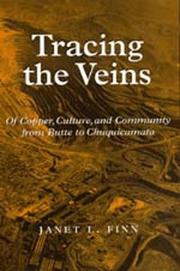| Listing 1 - 5 of 5 |
Sort by
|
Periodical
Publisher: [Washington, D.C.] : U.S. Department of Labor, Bureau of Labor Statistics
Abstract | Keywords | Export | Availability | Bookmark
 Loading...
Loading...Choose an application
- Reference Manager
- EndNote
- RefWorks (Direct export to RefWorks)
Wages --- Copper miners --- Metal-workers --- Anaconda Company

ISBN: 0520211367 0520211375 Year: 1998 Publisher: Berkeley : University of California Press,
Abstract | Keywords | Export | Availability | Bookmark
 Loading...
Loading...Choose an application
- Reference Manager
- EndNote
- RefWorks (Direct export to RefWorks)
This tale of two cities - Butte, Montana, and Chuquicamata, Chile - traces the relationship of capitalism and community across cultural, national, and geographic boundaries. Combining social history with ethnography, Janet Finn shows how the development of copper mining set in motion parallel processes involving distinctive constructions of community, class, and gender in the two widely separated but intimately related sites.
Anaconda Company. --- Copper industry and trade --- Social aspects
Book
ISBN: 9781943859429 Year: 2017 Publisher: Reno : University of Nevada Press,
Abstract | Keywords | Export | Availability | Bookmark
 Loading...
Loading...Choose an application
- Reference Manager
- EndNote
- RefWorks (Direct export to RefWorks)
"Open-pit mining was not just a new way to mine, but a new way to live. After the 1920s, hard-rock mines across the American West transitioned from underground operations to large open-pit holes. Butte, Montana, a well-known underground mining center, experienced this switch when the Anaconda Company began a large open-pit copper mine, the Berkeley Pit, which operated from 1955 to 1982. Although the Berkeley Pit gave the Anaconda Company and consumers easier access to copper, its effects on workers and community members were more mixed, if not detrimental. Mine labor was now safe, but the pit's open spaces also meant less freedom and camaraderie for workers. The pit's expanding boundaries became even more of a problem. As open-pit mining nibbled away at ethnic communities, neighbors faced new industrial hazards, widespread relocation, and disrupted social ties. Residents variously responded to the pit with celebration, protest, negotiation, and resignation. Even after its closure, the pit still looms over Butte. Now a large toxic lake at the center of a federally-led environmental cleanup, the Berkeley Pit continues to affect Butte's search for a post-industrial future. Using oral history interviews and archival finds, The City That Ate Itself therefore explores the lived experience of open-pit copper mining"--
Mineral industries --- Copper mines and mining --- History. --- Anaconda Company.
Book
ISBN: 0874175984 Year: 2018 Publisher: Reno, Nevada : University of Nevada Press,
Abstract | Keywords | Export | Availability | Bookmark
 Loading...
Loading...Choose an application
- Reference Manager
- EndNote
- RefWorks (Direct export to RefWorks)
rian James Leech provides a social and environmental history of Butte, Montana's Berkeley Pit, an open-pit mine which operated from 1955 to 1982. Using oral history interviews and archival finds, The City That Ate Itself explores the lived experience of open-pit copper mining at Butte's infamous Berkeley Pit. Because an open-pit mine has to expand outward in order for workers to extract ore, its effects dramatically changed the lives of workers and residents. Although the Berkeley Pit gave consumers easier access to copper, its impact on workers and community members was more mixed, if not detrimental. The pit's creeping boundaries became even more of a problem. As open-pit mining nibbled away at ethnic communities, neighbors faced new industrial hazards, widespread relocation, and disrupted social ties. Residents variously responded to the pit with celebration, protest, negotiation, and resignation. Even after its closure, the pit still looms over Butte. Now a large toxic lake at the center of a federal environmental cleanup, the Berkeley Pit continues to affect Butte's search for a postindustrial future.
Strip mining --- Copper mines and mining --- Anaconda Company. --- History. --- Butte (Mont.) --- Environmental conditions.

ISBN: 0520920074 0585047847 9780520920071 9780585047843 9780520211360 0520211367 9780520211377 0520211375 0520211367 0520211375 Year: 1998 Publisher: Berkeley University of California Press
Abstract | Keywords | Export | Availability | Bookmark
 Loading...
Loading...Choose an application
- Reference Manager
- EndNote
- RefWorks (Direct export to RefWorks)
This tale of two cities - Butte, Montana, and Chuquicamata, Chile - traces the relationship of capitalism and community across cultural, national, and geographic boundaries. Combining social history with ethnography, Janet Finn shows how the development of copper mining set in motion parallel processes involving distinctive constructions of community, class, and gender in the two widely separated but intimately related sites.
Copper industry and trade --- Anaconda Company --- Industries --- Business & Economics --- Metal trade --- Social aspects --- Anaconda Company. --- Atlantic Richfield Co. --- Anaconda Copper Co. --- Anaconda Copper Mining Company --- Anaconda Industries Co. --- anaconda company. --- anthropology. --- betrayal. --- business. --- butte. --- capitalism. --- chile. --- chuquicamata. --- class. --- community studies. --- community. --- consumption. --- copper mining. --- copper production. --- cultural boundaries. --- danger. --- ethnography. --- gender. --- geographic boundaries. --- global capitalism. --- local culture. --- miners. --- mining community. --- mining history. --- mining life. --- mining men. --- mining. --- montana. --- national boundaries. --- politics. --- privation. --- privilege. --- silicosis. --- social history. --- transformation. --- wasting.
| Listing 1 - 5 of 5 |
Sort by
|

 Search
Search Feedback
Feedback About UniCat
About UniCat  Help
Help News
News